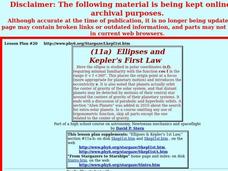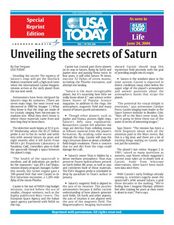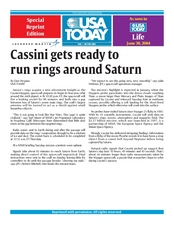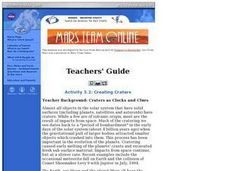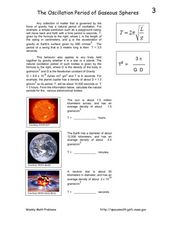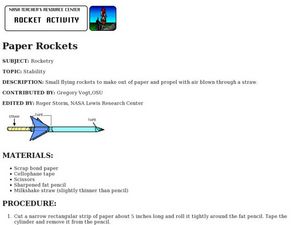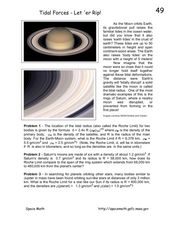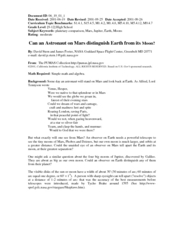International Technology Education Association
Pixel This!
Did the image I drew match the image you saw? By simulating a satellite and a ground station, teams of two transmit data in the form of pixels in order to recreate an image. They use four different levels of brightness, creating slightly...
Chicago Botanic Garden
Calculating Your Ecological Footprint
You can lower your ecological footprint by recycling! Lesson four in this series of five has individuals, through the use of a computer, calculate their ecological footprints. Through discussions and analysis they determine how many...
International Technology Education Association
Reinventing Time
Take a trip through time. A lesson resource provides instruction on the origin of current measurements for time. The text explains the different tools humans used throughout history to measure time as well as provides examples such as...
Curated OER
Space Trading Cards
Students use the Internet and other reference sources to gather information on a space topic. They create a trading card displaying the information learned and import pictures from libraries and the Internet.
Curated OER
Project SETI.
Tenth graders study how to search for life in outer space and make use of the 40-foot radio telescope at Greenbank, West Virginia. Request that the telescope be pointed at a particular location and time and receive data back from it...
Curated OER
The Mysteries of Saturn and Cassini
Students examine photographs of Saturn and make observations. They develop questions they have based on viewing the photos. They work together to answer their questions.
Curated OER
Satellites and the Radiation Budget
Students engage in a prelab discussion about the earth's radiation budget and global warming. They use "trading cards" to find specific websites to research radiation budget questions.
Curated OER
Ellipses and Kepler's First Law
The class examines graphs in the form r = F(¿¿) in polar coordinates (r, ¿¿), in particular with the circle, ellipse and other conic sections. They determine the nature of an ellipse by studying the role of the semimajor axis and...
Curated OER
Lotto or Life: What Are the Chances?
Though the website does not seem to have the mentioned video, a reding and lottery style games simulate the chances of finding intelligent life somewhere other than Earth. Without the video, this lesson is short, but it can be a useful...
Curated OER
Volcanoes in Space
Students research volcanoes on the Internet to compare/contrast the volcanoes on Earth to the ones found on Io, a moon of Jupiter. Students list the similarities and differences in science journals, and illustrate pictures of the volcanoes.
Curated OER
Unveiling the Secrets of Saturn
Students read and study an article then answer questions on Saturn. In this investigative lesson plan students identify ways space exploration has helped humanity and then they search the Internet for space pictures and sketch a drawing...
Curated OER
Cassini gets Ready to run Rings Around Saturn
Fourth graders study an article about Saturn. In this investigative lesson students discuss the article and complete an activity that asks them what question they would pose about Saturn.
Curated OER
Creating Craters
Students explore parts of an impact crater and compare and contrast craters found in Earth, the Moon, and Mars. Crater formation is modelled and the relationship of mass, velocity, and size of the projectile to the crater formation is...
Curated OER
The Oscillation Period of Gaseous Spheres
In this oscillation period worksheet, students read about how the force of gravity effects the oscillation of bodies. Students use two given formulas to identify the oscillation period of the sun, the Earth and a neutron star.
Curated OER
Paper Rockets
Students design, construct, and fly paper rockets that travel the greatest distance possible across a floor model of the solar system. They construct small flying rockets out of paper and propel them by blowing air through a straw.
Curated OER
Program Your Partner
Students explore the world of robotics. In this robotics lesson, students study the history of robots and work with partners to find out how hard it is to accurately guide robots through simple tasks.
NASA
The Drake Equation
In this Drake Equation activity, students read about how scientists can estimate the number of intelligent civilizations that may exist in our galaxy. Students answer 7 questions about the Drake Equation and they use the internet to find...
Curated OER
MAPPING THE TOPOGRAPHY OF UNKNOWN SURFACES
Students describe in words and graphic displays the elevation or depression profile of sections of Mars' Olympus Mons and/or Valles Marineris. They explain how orbiting spacecraft build up global maps one data slice at a time.
Curated OER
Tidal Forces-Let'er Rip!
In this tidal forces worksheet, students read about the gravitational pull from the moon that causes the ocean tides. Students solve 3 problems including finding the Roche or the tidal radius for the Earth and Moon, comparing the Roche...
Curated OER
Fostering Geospatial Thinking: Space to Earth: Earth to Space (SEES)
High schoolers locate and access data to help them with their science inquiry. In this geographical positioning lesson students evaluate and compare data sets.
Curated OER
Can an Astronaut on Mars Distinguish Earth from its Moon?
High schoolers explore the possibility of being on Mars and being able to identify the Earth. In this space lesson plan students complete a set of calculations to see if this is possible.
Curated OER
Determining the Altitude of Iridium Flares
Students examine what iridium flares are and when they occur. In this iridium flare lesson students complete an activity to see how far overhead Iridium satellites are.
Curated OER
Black Holes....II
In this black hole worksheet, students use the equation for time dilation to solve 8 problems including determining the time it takes to receive a GPS signal from space, the time delay for the GPS-Earth system, the distance a radio...
Curated OER
Impact Craters: Holes in the Ground!
Middle schoolers simulate crater formation through a lab activity. In this space science lesson, students calculate how much energy is transferred during meteorite impact. They identify different factors affecting the size and depth of...









